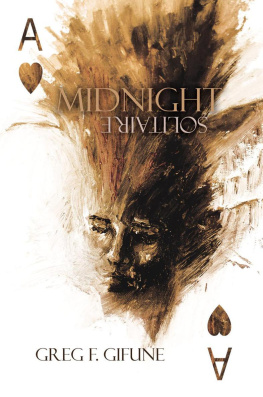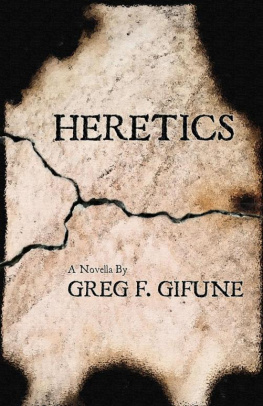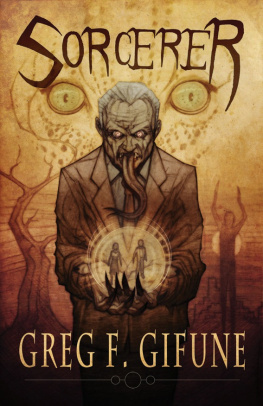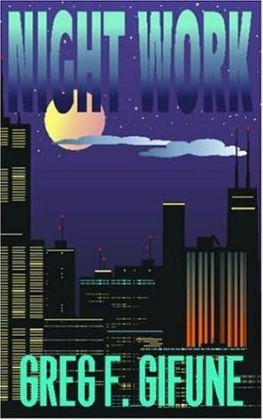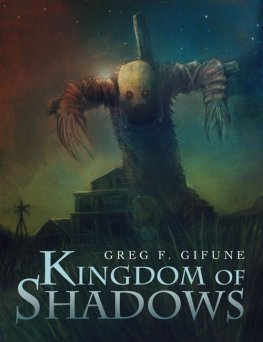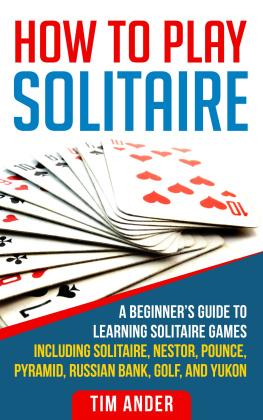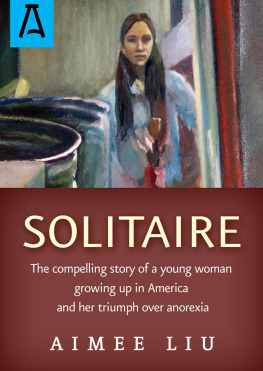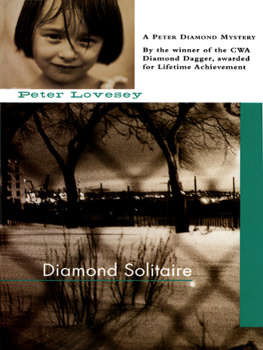Greg F. Gifune - Midnight Solitaire
Here you can read online Greg F. Gifune - Midnight Solitaire full text of the book (entire story) in english for free. Download pdf and epub, get meaning, cover and reviews about this ebook. year: 2011, publisher: Delirium Books, genre: Detective and thriller. Description of the work, (preface) as well as reviews are available. Best literature library LitArk.com created for fans of good reading and offers a wide selection of genres:
Romance novel
Science fiction
Adventure
Detective
Science
History
Home and family
Prose
Art
Politics
Computer
Non-fiction
Religion
Business
Children
Humor
Choose a favorite category and find really read worthwhile books. Enjoy immersion in the world of imagination, feel the emotions of the characters or learn something new for yourself, make an fascinating discovery.
- Book:Midnight Solitaire
- Author:
- Publisher:Delirium Books
- Genre:
- Year:2011
- Rating:4 / 5
- Favourites:Add to favourites
- Your mark:
- 80
- 1
- 2
- 3
- 4
- 5
Midnight Solitaire: summary, description and annotation
We offer to read an annotation, description, summary or preface (depends on what the author of the book "Midnight Solitaire" wrote himself). If you haven't found the necessary information about the book — write in the comments, we will try to find it.
Midnight Solitaire — read online for free the complete book (whole text) full work
Below is the text of the book, divided by pages. System saving the place of the last page read, allows you to conveniently read the book "Midnight Solitaire" online for free, without having to search again every time where you left off. Put a bookmark, and you can go to the page where you finished reading at any time.
Font size:
Interval:
Bookmark:
First Digital Edition
Published by:
Delirium Books
P.O. Box 338
North Webster, IN 46555
www.deliriumbooks.com
Midnight Solitaire 2011 by Greg F. Gifune
Cover Artwork 2011 by Daniele Serra
All Rights Reserved.
This book is a work of fiction. Names, characters, places and incidents are either a product of the authors imagination or are used fictitiously. Any resemblance to actual events, locales or persons, living or dead, is entirely coincidental.
For Nikki Grace
Artists must be sacrificed to their art. Like bees, they must put their lives into the sting they give.
Ralph Waldo Emerson
ONE
There are no clocks here.
A young woman in a black skirt, white blouse and black pumps sits at a small desk at the very end of a long and narrow hallway. The walls are bare, and the low ceilings and floors match their stark white color. Everything is so clean it has an antiseptic, slightly surreal feel, as if people rarely come here.
The woman, in her early twenties, is tidy, well kempt and has the look of a girl-next-door straight out of Central Casting. Her complexion is flawless, almost eerily so, her hair is pulled back into a bun at the rear of her head, her makeup is applied with precision and restraint, and her fingernailskept at a modest lengthare manicured and painted with a shiny clear gloss.
Her desk, a small, sparse, white unit that fades effortlessly into the background, is completely clear but for a delicate teacup and saucer in its center and a red rotary telephone in the upper right-hand corner that is so bright it looks as if its been dipped in blood.
She sits quietly in the quiet hallway, back perfectly straight, eyes staring straight ahead at nothing, hands folded neatly in her lap.
After a moment, one of the small lights on the telephone begins to blink. She carefully lifts the receiver, places it to her ear then depresses the button. She listens then replaces the handset without saying a word.
She rises to her feet, and, taking the teacup and saucer with her, slowly makes her way down the long hallway, her heels clacking tile as she goes.
When she reaches the end of the hallway, she comes to a closed door. Without hesitation, she presses a series of buttons on a pad to the right of it.
The door opens silently, and she slips through into a small, dimly lit room. A long meeting table faces a large and long panel of glass. Six people sit at the tablefive men and one womanspeaking to each other in anxious whispers, nervous with anticipation. Before each of them are open folders or briefcases, and although one of the men, the oldest in the room, is dressed in a military uniform, the others, clad in suits, appear to be civilians. The men and woman are older, sixty or more, but onea dwarfis a bit younger, perhaps in his late thirties. Beyond the large glass panel is only darkness, their ghoulish reflections barely discernable in the black glass.
The young woman with the tea moves behind them and carefully places the teacup and saucer down in front of a bloated gray-haired man with bug eyes and pasty, unhealthy-looking skin. Unlike the others, he is not engaged in any sort of conversation, but instead stares at the glass as if attempting to make something happen through sheer will. Next to him is a red rotary phone matching the one on the desk out in the hallway.
He does not seem to notice the woman has put his tea down for him.
She turns and leaves the room without comment.
It is only then that the man raises the teacup to his mouth, delicately, as if afraid he might break it otherwise, and takes a loud, slurping sip. He swallows, puts the cup down and leans forward on the table, resting his flabby chin in his hand and staring intently as ever at the glass.
Your attention, please, an unnaturally calm, monotone female voice says from a speaker in the ceiling. Its beginning.
The others cease their conversations and focus on the glass.
Behind it, a light gradually appears and rises, revealing what lies on the other side of the glass.
A room that resembles an operating theater comes into view.
On a table in the center of the room is a nude dark-haired woman lying on her back. She is unconscious and intubated with a breathing tube that runs to a respirator.
And she is more than eight months pregnant.
TWO
The man runs as best he can, hobbling along on one leg as his other drags behind him; useless and flopping about like the snapped and mangled limb it is. He pushes on despite the agonizing pain, moving fast as he can, which is not very fast at all, and shuffles down the middle of the road, using the center lane as a guide in the dark so he doesnt lose his way. Between night and the beginnings of snow flurries swirling about before his eyes, visibility is low. The storm is just beginning, but already skinny serpentine lines of snow slither along the pavement, snakes of salt sidewinding from one lane to the next. His heart pounds his chest and his lungs wheeze and burn in the bitter cold, but he struggles not to cough. Something has broken deep inside him and he knows coughing will only make it worse. He chances a look back over his shoulder into the darkness. No lights. No sign of life or anyone following. Just pitch black night littered with snow flurries and trails of breath escaping him in smoky spirals. But he knows its only a matter of time. His pursuer is back there in the dark, toying with him the way a cat allows a mouse to flee to the very edge of its reach before casually snatching it back and snapping its neck.
His dead leg scrapes the ground, the sound mingling with his labored breath and occasional groans of pain. The wind whistles, cutting through him like a blade as it echoes along the otherwise empty highway. An endless stream of frantic thoughts floods his mind. Am I awake? Is this really happening? Where is he? How far behind me is he now? Why isnt he still chasing me? What is he waiting for? Is he gone? Have I made it? Will someone come? Sooner or later someone will come, wont they? A car has to come eventually. AndCarey! What about Carey? Oh God, Carey, wherewhere is she? Does he have her? Is that why hes given up on me?
He stops a moment. Bent over and trying to catch his breath, he looks back at the long stretch of road from which he came. Darkness. Nothing. He begins to remember the attack, the car that seemed to come out of nowhere slamming into theirs, the screams, Carey being dragged off by her hair into the night as if the darkness itself had come alive and taken her, kicking and screaming for help that would never arrive. He recalled falling from the car, dazed and bloodied, his ears ringing and his vision blurred, and how again the black car had returned, exploding from the darkness and this time striking him. The unimaginable violence of the impact sent him airborne, and he remembers crashing back to the pavement like a ragdoll and laying there looking up at the black sky, wondering if this was where and how he would die. But then hed remembered Carey, and he knew he had to get up, had to try to help her. Hed struggled to get to his feet, fighting to remain conscious, but by the time he was able to move and regain his bearings, she was gone, her screams no more. And just when he thought he was alone, the silhouette of a man emerged from the darkness, coming toward him with long, purposeful strides, the heels of his boots clacking pavement and the rustling of his long leather duster flapping in the wind. But what he remembers most are the mans eyes, yellow and inhuman, glowing impossibly in the night.
His only memories from there are running, hobbling off as best he could, in shock, in agony and drowning in terror and confusion. What had happened, what was happening?
He looks out at the long stretch of road before him. Surely there must be a gas station or motel or something at some point on this godforsaken highway. But he knows he cannot continue on much farther. The pain is becoming too great, and hes freezing and starting to shut down from loss of blood and the cold. He straightens up as best he can and wipes the wetness from his eyes.
Next pageFont size:
Interval:
Bookmark:
Similar books «Midnight Solitaire»
Look at similar books to Midnight Solitaire. We have selected literature similar in name and meaning in the hope of providing readers with more options to find new, interesting, not yet read works.
Discussion, reviews of the book Midnight Solitaire and just readers' own opinions. Leave your comments, write what you think about the work, its meaning or the main characters. Specify what exactly you liked and what you didn't like, and why you think so.

